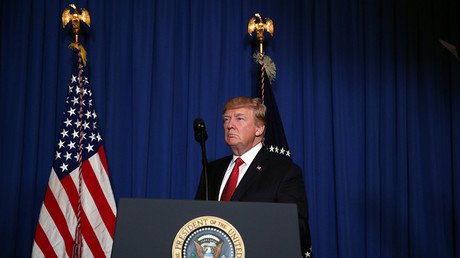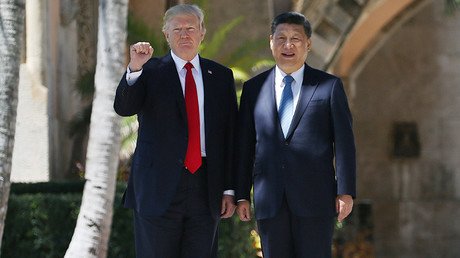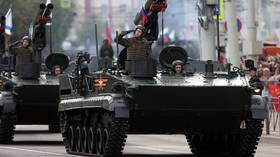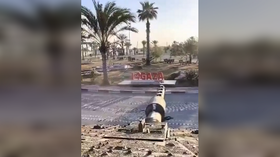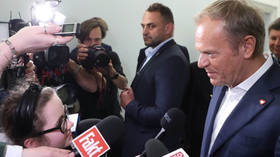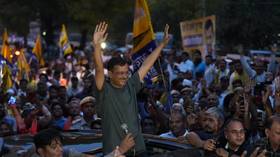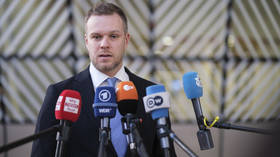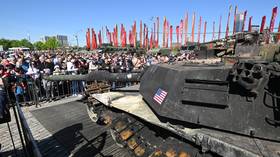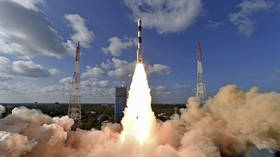‘$64 question: Where is US evidence Assad behind Idlib chemical attack?’
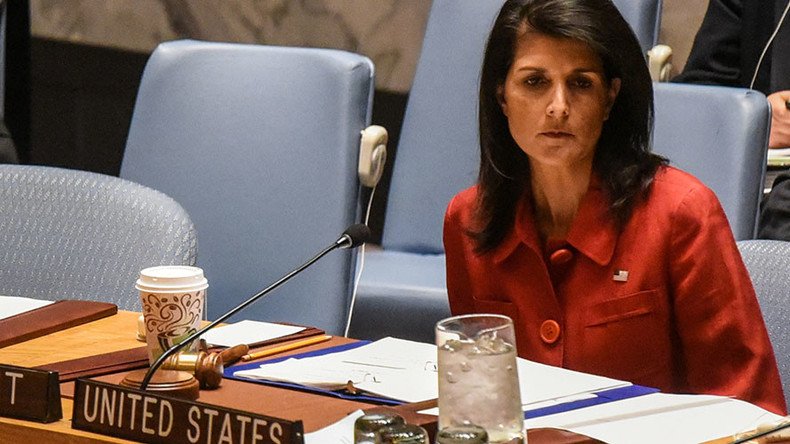
Trump’s ‘Wag the dog' gambit in Syria echoes the 1983 Reagan invasion of Grenada to distract attention from the tragedy of US marines being blown up in Lebanon. It is also a signal to China and Iran, says historian Gerald Horne.
The US says its missile strike on the Syrian airbase was in retaliation for the chemical attack in Idlib province which killed scores of civilians on Tuesday. However, Damascus firmly rejects any involvement.
America's UN envoy Nikki Haley held up images, purporting to show child victims of the chemical incident. She said it bears all the hallmarks of the Assad regime's use of chemicals.
The Russian Foreign Ministry stressed that no probe into Syrian government involvement in the Idlib attack had been conducted yet. Spokesperson Maria Zakharova pointed out that, despite the US calling for an investigation, the country then went on to destroy the planes they wanted to investigate, adding that it has nothing to do with establishing the truth.
The US ambassador to the UN insists though that the evidence exists.
RT: Nikki Haley referred to "classified" evidence proving that Bashar Assad was responsible for the chemical incident in Idlib province. If they really have this evidence, why do you think they are withholding it from the UN?
Gerald Horne: That is the $64 question. It reminds us that after the last chemical attack in August 2013, the highly regarded journalist in the US Seymour Hersh did an investigation which pointed to the culprits in that particular attack was not the Damascus regime or President Assad but in fact, the rebels assisted by their external allies. Then, of course, there is a legal question. That is to say, where the UN resolution that authorized this attack on Syria is? I take it that there was no imminent threat of a Syrian attack on the US. So, I am wondering what is the legal justification in international law for the US attack in Syria. Then there is the question of domestic law. That is to say the US Constitution gives Congress the right and the authority to allow the US to go to war, there is no existing credible resolution from Congress that would have authorized this attack on Syria. And then there is a political question. It is well-known Trump was facing a range of scandals, and it is also well-known that there is a history of US presidents facing difficulties at home waging war abroad. This was the plot of the widely popular movie of 1997 called Wag the Dog and certain pundits are calling this the ‘Wag the Dog' gambit by Mr. Trump. And I also recall that in 1983, the day after US marines were blown up in Lebanon, Ronald Reagan, the US president invaded the tiny Caribbean island of Grenada to distract attention from that tragedy. This attack on Syria has echoes of 1983.
RT: Despite the bombardment, the al-Shayrat base is still functional, and planes have been taking off from there. Republican Senator Lindsey Graham said it's a "serious mistake". What's the logic behind that? Should Assad be getting permission from Washington to use his own base in his own country?
GH: Obviously, that is ridiculous and ludicrous, but we have to keep our eye on the ball and recognize that there is a larger game at play. Keep in mind that there had been repeated confrontations in the first few months of 2017 between Iranian speed boats and US vessels in the Persian Gulf. It is no secret Mr. Trump is hostile to the Iranian regime. It is no secret that he would like to see regime change in Tehran. And since Iran is a major supporter of the Damascus-based regime, it seems to me that these missiles aimed at Damascus were also incidentally aimed at Tehran. Likewise, I don’t find it coincidental or accidental that President Xi Jinping was in Florida at the same time that Mr. Trump authorized this attack on Syria. Not only because Mr. Trump was placing pressure on China to place pressure on its ally in North Korea…But also there is a lot of hysteria in the US about the rise of China. And this muscle-flexing on the part of Mr. Trump was also a signal to China just as in 1999 the US “accidently” attacked the Chinese Embassy in Belgrade as a way to give a signal, not so subtle, to China.
Iranian political scientist Kaveh Afrasiabi, commented on the US ambassador to the UN's statement that the US needs to "get the Iranian influence out" of Syria: “I could only conjecture that she means the US is going to increase its creeping intervention inside Syria and throw its weight behind various rebel groups in order to roll back against what the Syrian government, with the backing of Russia and Iran, has made over the past two years.”
“This reflects the roll-backing strategy on the part of the US that is very unfortunate because it transpires at a very delicate time in the peace process when the talks between the Syrian government and opposition in Astana are proceeding as well as a parallel track in the European capitals,” he continued.
In Afrasiabi’s view, the US' attack on the Syrian airbase “was meant to torpedo the peace process” which is part of the strategy “held by the leadership in Israel, Saudi Arabia, and Qatar.”
“They see growing Iranian influence, and they want to reverse that,” Afrasiabi told RT.
WATCH MORE:
The statements, views and opinions expressed in this column are solely those of the author and do not necessarily represent those of RT.
